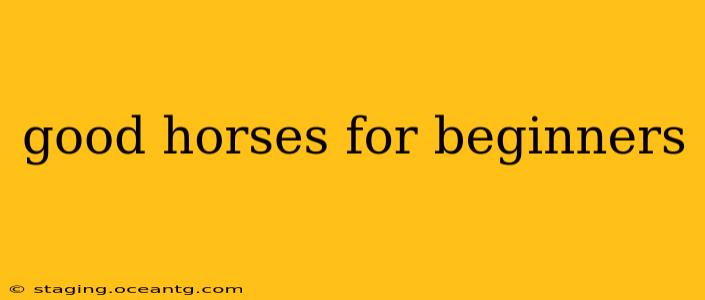Choosing your first horse is an exciting but daunting task. The right horse can ignite a lifelong passion, while the wrong one can quickly extinguish it. This guide focuses on identifying breeds and temperaments well-suited for novice riders, emphasizing safety, reliability, and a positive learning experience. We'll also address common questions beginners have about finding their ideal equine companion.
What Makes a Good Horse for Beginners?
Before diving into specific breeds, let's define the essential qualities of a beginner-friendly horse:
- Calm and Steady Temperament: A horse prone to spooking, bolting, or exhibiting unpredictable behavior can be dangerous for inexperienced riders. A calm disposition is paramount.
- Patient and Forgiving: Beginners will make mistakes. A horse that's patient and forgiving of novice rider errors is crucial for building confidence and avoiding accidents.
- Well-Trained and Experienced: An experienced horse that understands basic commands and has been ridden regularly will be much easier to manage than a green horse.
- Appropriate Size and Build: A horse that's too large or too small can be difficult to handle. A horse of medium size and build usually proves ideal for beginners.
- Sound and Healthy: A horse with underlying health issues can be unpredictable and prone to injury, posing risks for both horse and rider.
What Breeds Are Good for Beginners?
Several breeds are known for their calm temperaments and suitability for novice riders. However, remember that individual horses within a breed can vary greatly in personality. It’s crucial to assess the individual horse, not just the breed.
- Quarter Horses: Often cited as a top choice, Quarter Horses are known for their calm, willing nature and smooth gaits. Their versatility makes them suitable for various disciplines, from Western riding to English riding.
- American Quarter Horses: These horses combine docility with athleticism, making them great for beginners who want to eventually progress to more challenging riding activities.
- Morgan Horses: Known for their intelligence, willingness to please, and versatility, Morgans make excellent partners for both pleasure riding and more advanced disciplines.
- Haflingers: These smaller horses are exceptionally gentle and have a calm temperament, making them popular choices for younger or smaller riders. Their surefootedness is also a plus.
- Connemara Ponies: These ponies are known for their calm and steady temperament and are sturdy enough to handle less-experienced riders.
- American Paint Horses: Often showcasing striking coat patterns, these horses combine the calm temperament of Quarter Horses with beautiful aesthetics.
What Age Horse is Best for a Beginner?
Generally, a horse between 5 and 15 years old is considered ideal for a beginner. Younger horses are often less predictable, while older horses can sometimes have health issues. However, the horse's individual temperament and experience are more crucial than age.
Where Should I Look for a Beginner Horse?
Finding the right horse requires careful research and consideration. Here are some options:
- Reputable Breeders: Breeders are a good place to start. They often have a deep understanding of their horses' temperaments and can offer valuable guidance.
- Experienced Trainers: Trainers often have horses for sale or can guide you towards suitable options.
- Local Riding Schools or Stables: These establishments may have school horses that are well-trained and suitable for beginners, and could have horses for sale.
- Online Classifieds: While using online resources can be tempting, exercise extreme caution and always thoroughly vet any horse you consider buying.
How Much Does a Beginner Horse Cost?
The cost of a horse varies greatly depending on the breed, age, training, and location. You should budget for expenses beyond the initial purchase price, including:
- Veterinary care: Regular checkups, vaccinations, and potential treatments for illnesses or injuries.
- Farrier: Regular hoof trimming and shoeing.
- Boarding: Costs associated with stable upkeep, food, and shelter.
- Equipment: Saddles, bridles, halters, and other essential riding gear.
What Should I Look for in a Horse's Temperament?
Observe the horse's behavior in various situations. Look for signs of calmness, docility, and willingness to cooperate. A horse that is easily startled or exhibits aggressive behavior is not suitable for a beginner.
How Can I Tell if a Horse is Right for Me?
This is highly subjective, but spending time with the horse in different settings is crucial. Test ride the horse, if possible. A good match will feel natural and comfortable. Trust your intuition.
Remember, finding the right horse is a journey. Take your time, do your research, seek advice from experienced riders and trainers, and most importantly, choose a horse that you connect with and feel confident riding. The bond between horse and rider is the most important factor in a successful partnership.
